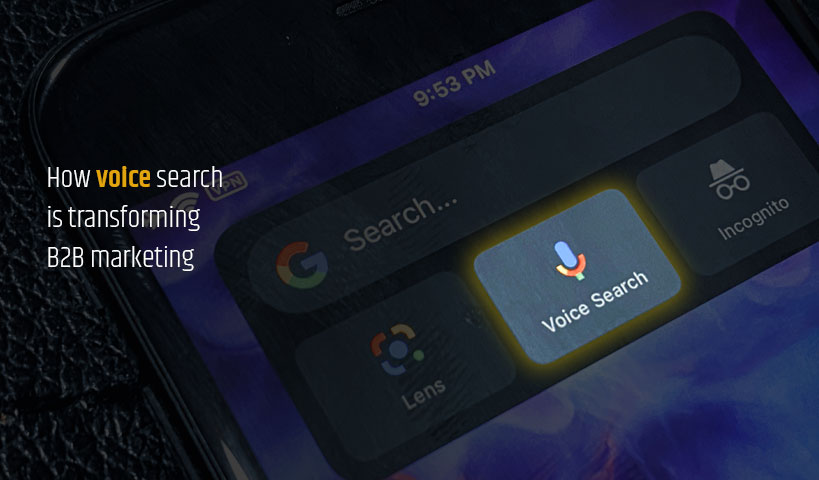
B2B marketing goes voice: are you ready? A few years ago, talking to a machine was science fiction. Today, many search engines such as Google and Bing answer our questions by voice, even in a professional context. In B2B, the voice search revolution is underway, and it’s moving much faster than anyone imagined.
I spent the weekend working on a content strategy for a client, and I have to say that voice search and the growing use of Bing with AI, among other things, is changing everything. Even in B2B marketing.
Did you know that 27% of B2B queries on Google are already made by voice? And that by the end of 2025, over 50% of searches will be by voice? This figure continues to rise as technology evolves and the habits of decision-makers change. But the question is: is your business being found when someone does a voice search on Google or Bing, looking for solutions tailored to their needs?
Voice search: a quick test
Test it now: open your phone, launch Google Search or Bing, and ask a question your customers might ask, such as:
‘What’s the best ERP for manufacturers in Quebec?’
Or, ‘What are the SaaS solution providers for the industry?’
If your company doesn’t appear in the voice response… you’re invisible. Why is voice search a strategic issue for B2B? The figures speak for themselves… We’re going through a rapid digital transformation, and B2B is no exception. Here are a few statistics from the Synup website that should make you think.
Voice search: some statistics
- By the end of 2024, around 80% of voice searches will be in the form of conversations, moving away from traditional search methods
- Expect to see a sharp increase in ‘near me’ and local searches, which account for 76% of voice searches and are expected to triple as more users search directly for information about local businesses
- The global voice recognition market is expected to reach $26.8 billion by the end of 2025
- 1 billion voice searches are carried out every month via mobile and voice search devices
- Voice search generates more than $2 billion in sales.
- Voice-assisted search is expected to generate more than $40 billion by the end of 2025
- 71% of executives prefer to use their voice to find a solution rather than typing on a keyboard
If your business isn’t optimised for voice, it simply doesn’t exist in these searches. Take a second to imagine: a factory manager in Canada or the United States is looking for an ERP solution. He’s no longer typing in ‘Best ERP for manufacturing’, he’s asking: ‘What’s the best-performing ERP software for an industrial SME?’
The first vocal result gets his attention. They click, they visit the site, they send a request for information. But what about you? If you don’t appear, you’re missing out on a valuable opportunity without even knowing it.

5 steps to optimise your B2B voice SEO
Do you want to be found in voice search? Here are the 5 essential steps to optimise your visibility.
1. Write like your customers talk
Voice users speak naturally. They don’t just use technical keywords, they ask complete questions.
‘How does artificial intelligence help manufacturers?’
Immediate action :
- Incorporate natural questions and answers into your content
- Write as if you were answering a prospect asking you a question in person
- Create an FAQ optimised for voice search
2. Google My Business: essential for voice
Companies that are well referenced locally are favoured by voice search. Check that the information on your listing is up to date and optimised:
- Your address and telephone number are up to date
- Your description contains strategic keywords
- You have customer reviews (the more positive they are, the more likely you are to be recommended vocally)
Example :
‘Where can I find a supplier of industrial parts in Montreal?’
If your Google My Business listing is well optimised, Google Assistant will recommend your business first!
3. Voice search: aim for ‘Position Zero’ on Google
When a voice assistant answers a question, it reads the first optimised extract in Position Zero. Target this position. How can you do this?
- Keep your answers short and to the point (40-50 words max)
- Use bullet lists (Google loves them!)
- Add structured tags (schema markup) to help Google understand your content
Voice-optimised example:
‘ERP software enables manufacturers to optimise production, reduce errors and improve efficiency.’
4. Optimising your content for voice search (and its challenges!)
In Quebec, voice search poses a unique challenge: voice assistants have a very poor understanding of Franglais and mixed languages. So how can you avoid making mistakes?
- Keep your English and French content separate
- Don’t mix languages in the same sentence
- Test your own voice queries to see how Google understands your site
If Google misinterprets your content, you risk being left out of the voice results.
5. Monitor and adjust your voice SEO strategy
Voice SEO, like traditional SEO, is constantly evolving. Your strategy needs to be updated regularly. Here are a few key actions:
- Test your voice visibility every month by asking typical questions
- Use Google Search Console to analyse your voice queries
- Update your content to reflect new search trends
Voice search is already transforming B2B marketing. Companies that adapt now will be one step ahead of their competitors.
Test your voice visibility, apply these optimisations to your website and find out how ExoB2B can help you optimise your B2B marketing. Contact us now!




